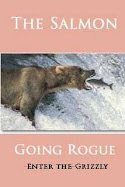In this piece, Andrew Gumbel is lamenting what he sees as an unlevel playing field of the democratic party’s nominating process and then he veers off course and argues that the presidential election process has been hijacked several times in our history when he writes;
The will of the people has been even more compromised when it comes to general elections for the presidency. In fact, on every occasion in American history when the race for the White House has been close enough to be contested, the candidate with fewer votes has prevailed.It happened in 1800 -- admittedly, an age before mass suffrage rights -- when Thomas Jefferson managed to tie Aaron Burr in the Electoral College. Jefferson eventually won the election in the House of Representatives, thanks to the distorting effect of the "federal ratio" -- the rule that gave Southern slave owners an additional 3/5ths vote for each adult they enslaved.Although I find the whole argument rather inane I will address the assertions about the 1800 election because that is Mr. Gumbel's first andmost egregious distortion of history. To be clear, Jefferson did not "manage to tie" Burr. Burr was in fact the vice presidential nominee, while incumbent President John Adams was the opponent in 1800. Jefferson beat Adams handily with 61% of the popular vote that was cast. It must be noted that some states at the time chose their electors in the legislature and not by popular vote. He also beat Adams in the number of electors.
It happened in 1824…. It happened in 1876…And, of course, it happened in 2000…
(Emphasis added)
The tie with Burr came in the Electoral College where electors had two votes, one for president and one for vice president but they did not have to specify which candidate they were voting for and in one of the bigger blunders in politics no one in the Democratic–Republican Party had the foresight to have just one elector not vote for Burr to ensure Jefferson’s victory. As a result the election was thrown into the House of Representatives. Burr, who was widely known at the time as a rather unscrupulous fellow, found himself in the position where he could possibly take the presidency. There is not evidence that Burr campaigned within the House to become president neither did he concede the position to Jefferson. With some behind the scene lobbying by Federalist Alexander Hamilton, who distrusted Jefferson but hated Burr, the House finally elected Jefferson on the 36th ballot. Vice President Burr would later kill Hamilton in their infamous duel.
The further assertion by Mr. Gumble that the Constitutional 3/5 Compromise skewed the election is actually the argument of writer Garry Wills in his book “Negro President": Jefferson and the Slave Power” and parroted by Edward Larson in “A Magnificent Catastrophe: The Tumultuous Election of 1800, America's First Presidential Campaign". I find Mr. Wills argument rather simplistic so on that level I would argue that if not for the 3/5th Compromise there would not have been an election for president at all because there would not have been a Union. But more importantly I would also add that although it’s fun to play “what if” the fact remains that the Compromise was the law and the politics of the day. For Wills or Gumble to assert that the election result was somehow tainted because of what was 19th century political reality is an example of historical revisionism at its darkest.
Note: The Hoover Institute has a debate between Garry Wills and historian Jack Rakove about the effects of the 3/5 Compromise on early American politics. Their differences on applying today’s moral standards to historical events is particularly interesting. (Run time is 25 min.)
Note II: Since I spend an hour or two a day in the car for my commute to the U, I have taken to listening to books on CD from the local library. I had recently finished the Larson book and although I thought at the time that his 3/5 compromise interpretation was odd I didn't really question it until I came upon it again in the Gumble article. Strange how those things happen eh?




_edited-1.jpg)



